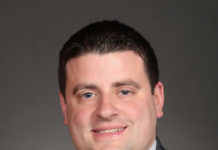After a conversion therapy ban failed to pass through the Iowa House in 2015, a group of individuals petitioned the Iowa Board of Psychology to adopt administrative rules to ban conversion therapy at a May 6, 2016 meeting.
Aditi Rao, who at the time was vice-chair for the State Youth Advisory Council, said the group tried initially in the Legislature, but they were informed there is a lack of understanding by legislators. The group requested the board help by either banning conversion therapy outright or to work with the subcommittee set up by the Board of Medicine to review the issue.
Nate Monson, executive director of GLBT Youth In Iowa Schools Task Force (Iowa Safe Schools), said while conversion therapy methods have changed over several decades, the end goal has stayed the same. Monson said it is based on the unscientific idea that you can change sexual orientation or gender identity. He took exception to the use of hypnosis, behavior and cognitive therapies, sex therapies and psychotropic medication. He claimed minors are often coerced into these therapies by their parents.
Denise Hagerla, a licensed independent social worker with Unity Point Health, said practitioners are primarily using cognitive behavior conditioning techniques. She said she is not aware of any psychologists doing conversion therapy. She said the issue is if a minor is forced to undergo the treatment and that the issue is not related to adults.
The petition, like the proposed legislation of 2015, only addressed minors and only addressed treatment that changes homosexual orientation to heterosexual. It allows only for therapy that provides acceptance, support and understanding of the individual’s facilitation of coping, social support and identity exploration and development.
Iowa Board of Psychology member Earl Kilgore, Ph D., said he believes a licensing entity would review reports of aversive therapies.
Nathan Oppman of The FAMiLY Leader provided public comments in support of some aspects of conversion therapy. He expressed concern for the faith community since Christian teaching on the subject has historically concerned the behavior of the individual. He stated he believes individuals should be able to seek to change in accord with their beliefs, through licensed practitioners. Harmful practices should be banned, he said, but they shouldn’t be tied to a politicized issue.
Alex Bare, a student at the University of Iowa and member of the Youth Advisory Council, said he didn’t want to stifle anyone’s freedom to seek out therapy practices if they’re 18 or older.
The conversation continued about the petition on Aug. 12, 2016.
However, board member Heidi Vermeer-Quist, Psy D., noted that current rules reference the APA Ethics Code and already cover discriminatory practices. The Board’s consensus was to address any complaints of conversion therapy through the Board’s existing disciplinary rules.
While the petitioners expressed concern over minors being able to file complaints, the Board assured them minors are permitted to file complaints against licensed psychologists with the Board.
Henderson moved that the Board deny the petition to adopt administrative rules relating to sexual orientation chance practices. Vermeer-Quist seconded the motion and the Board unanimously voted in favor of the motion.
At a Nov. 4, 2016 board meeting, Iowa Board of Psychology executive director Sharon Dozier shared a press release from the Iowa Board of Medicine. The Iowa Board of Medicine conducted a subcommittee on sexual orientation change efforts.
The Board of Medicine accepted the subcommittee report, which concluded that “a specific administrative rule prohibiting Iowa-licensed physicians from engaging sexual orientation change efforts, or conversion therapy, on patients under age 18 is not necessary at this time.”
The Board of Medicine said existing rules provide a process to investigate and evaluate a physician by national ethics and national standards, which oppose the controversial therapy on individuals of any age.
The subcommittee was established in April of 2016 after the Board of Medicine denied a petition calling for an administrative rule to ban conversion therapy.
“The Board determined it did not have sufficient facts to initiate rulemaking but asked the subcommittee to study conversion therapy practices, regulations and standards of care and make a recommendation on rulemaking,” the release said. “The subcommittee did recommend that all Iowa physicians become more knowledgeable of the healthcare needs of the patients who are lesbian, gay, bisexual or transgender.”












